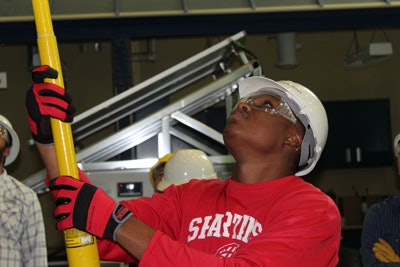Indian River State College (IRSC), a community college in Florida, created a new approach to help minority and low-income students overcome the math barrier for entry into selective enrollment programs across the country.
The program, titled Redesigning Math: The Nuclear Case Study,was published in December 2016 and focused on a cohort of 12 students with a math deficiency, and studied underserved African American populations over the course of one semester. Five of the 12 students, or 40 percent were African American.
 Tyrone Joseph practices his skills during his internship with FPL at IRSC’s Brown Center.
Tyrone Joseph practices his skills during his internship with FPL at IRSC’s Brown Center.Kevin Cooper, the Dean of Advanced Technology at IRSC and the Primary Investigator of Regional Center for Nuclear Education and Training (RCNET), a National Science Foundation ATE Center, said students were chosen to be in the cohort if they needed remedial math and were not ready for intermediate algebra or had failed intermediate algebra in the past.
To make the program applicable to a field which requires a level of numeracy and literacy before enrollment, researchers from RCNET chose to look at the nuclear radiation protection technician track, which is offered at 40 community colleges across the nation. Cooper said the 40 community colleges first heard about this new approach through “direct contact, presentations at national conferences” and “a paper distributed to hundreds of colleges.”
“The common similarities [between IRSC’s program to the other institutions] was the industry interaction, making them understand the context and importance of the math, embedding the math in the classes with real nuclear examples, and the constant monitoring,” Cooper said in an email interview with Diverse.
Radiation protection technicians are required to understand radioactive decay and half-life (exponentials and logarithms) and radioactive distance (inverse square law), which is the college equivalent to intermediate and college algebra classes.
The study noted that nuclear technicians account “for over 2.6 million jobs and $120 billion towards the United States GDP” and by 2030 will “have over 65,000 high-paying nuclear career opportunities.”
“African American employment in nuclear industry is lower than national averages in similar fields and lower than all other minority groups and the needle has not moved in 40 years,” Cooper said. “Data indicated by National Nuclear Agency, NEI [said] while potential program applicants had the mechanical aptitude, they lacked the math skill and were turned away from the program nationwide.”
Before the semester started, each student met with their college tutor to determine which learning method they would prefer for their math class: traditional classroom style, virtual, blended, or full lab. The students then met with a college advisor to enroll in their preferred style of intermediate algebra and the advisor designed a “custom guided pathway” for them to be successful. Additionally, each student had to sign a memorandum of agreement stating they would complete the work assigned to them each week and meet with their tutor at least once a week.
Nine of the students had a pathway in which they took intermediate algebra in their first semester, college algebra in their second, and also took a general education requirement during the summer in order to stay on track with the rest of the students in the cohort, the study said.
“I heard about the type of careers you could get from IRSC’s nuclear program, how much they pay and how many opportunities there were, but I couldn’t get into the program because I lacked the math,” Tyrone Joseph, one of the IRSC students who participated in the study, told Diverse in via email. “This gave me the opportunity I dreamed about.”
Hykeem Spencer, another one of the students in the cohort, said the workload was “very difficult, but when I saw my classmates putting in the time and effort and met people my age from industry that talked about how they were making over $100K a year, it motivated me to try harder.”
“The assignments were general math at first but over the year turned into nuclear questions about radiation and decay and stuff,” Spencer said via email.
Throughout the semester, “the tutoring lab updates the IRSC’s nuclear program coordinator about attendance in the lab” each week, the study said. All of the students’ grades were monitored monthly by a program coordinator.
If a student in the cohort passed intermediate algebra, they took college algebra the following semester and continued to have tutoring. If a student failed the course, they attempted the class again in the next semester under a different pathway, continued to have tutoring and took additional classes in the following semesters to stay on track.
All five African American students passed, three of whom were on their last attempt in intermediate algebra; eight of the nine students needing intermediate algebra passed with a B or higher and passed all of their classes; the one student who failed, also failed all of his classes and has transitioned to the welding program; and all eight that passed enrolled fulltime for the following semester.
Both Joseph and Spencer said they enjoyed the overall experience of the program and even gained confidence in math. “I couldn’t have dreamed about the amount of support I’d receive at IRSC,” Joseph said. “They cared [about me] and made me work harder.”


















